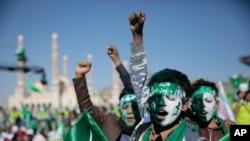Saudi-owned media applauded the announcement by U.S. Secretary of State Mike Pompeo that he will ask Congress to place Yemen's Houthi militia group, which controls the capital, Sana’a, on the list of state sponsors of terrorism. The decision follows last month’s Houthi drone attack on Aden airport, controlled by the rival Yemeni government of President Abdrabbu Mansour Hadi.
Pompeo indicated in a tweet that the action was intended to "confront” the Houthis' terrorist activity and "deter further malign activity by the Iranian regime in the region." Iran and its Lebanese Hezbollah proxy militia reportedly arm and train the Houthis.
Ahmed Bin Mubarak, foreign minister of the Saudi-backed Yemeni government, told Arab media that the U.S. decision was made "to punish the Houthis for various terrorist acts," including the recent attack on Aden airport which killed and wounded dozens, attacks on Red Sea shipping and Houthi missile attacks on Saudi Arabia.
Houthi spokesman Mohammed al Bukheiti told Arab media that the U.S. decision was "destined to fail and would make negotiations more difficult, in addition to making the (Houthi group) stronger."
Saudi analyst Majid al Turki told Qatar's al Jazeera TV that he did not think the move would make negotiations more difficult, saying, "Kuwait tried for months to conduct negotiations between rival Yemeni forces” and was unable to broker a deal.
Iranian Foreign Ministry spokesman Saieed Khatibzade said in a press conference Monday that the decision marked — in his words — “the bankruptcy of the outgoing Trump administration." The Yemen conflict, he added, "must come to the negotiating table, sooner or later."
Khattar Abou Diab, who teaches political science at the University of Paris, tells VOA that there is a "political dimension to the U.S. move since the Trump administration would like to make the Houthis sit down at the negotiating table and accept a U.N.-brokered settlement of the Yemen conflict."
Iran-based analyst Imad Abshans told Arab media that the administration "only has nine days left and then everything is going to change."
Paul Sullivan, a professor at the National Defense University in Washington, however, thinks that "revoking (a terrorism) designation is not simple" and that "with everything that is going on in Washington, this is going to take the back burner."
He said a lot of people in Washington find Iran a threat to the U.S. and that the Houthis are seen as an ally of Iran. He said it doesn’t seem likely that things are going to improve for them, even under the Biden administration.
Joe Biden will be inaugurated as the 46th president of the United States on January 20.




